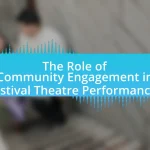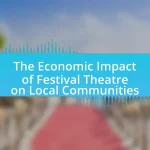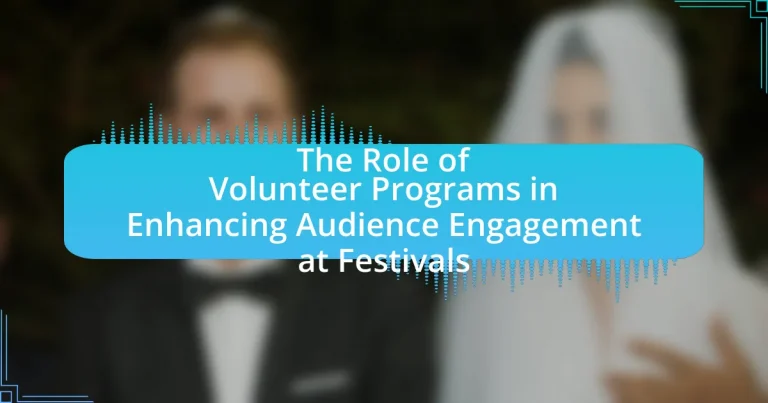Volunteer programs are essential for enhancing audience engagement at festivals by fostering community connections and providing interactive experiences. These programs enable volunteers to directly interact with attendees, leading to increased satisfaction and retention rates. Research shows that festivals with active volunteer participation report higher levels of audience engagement, as volunteers assist in various operational roles and create a welcoming atmosphere. The article explores the specific roles of volunteers, their impact on festival operations, and best practices for designing effective volunteer programs to maximize audience engagement. Additionally, it addresses challenges in volunteer management and highlights future trends in utilizing technology for volunteer coordination.
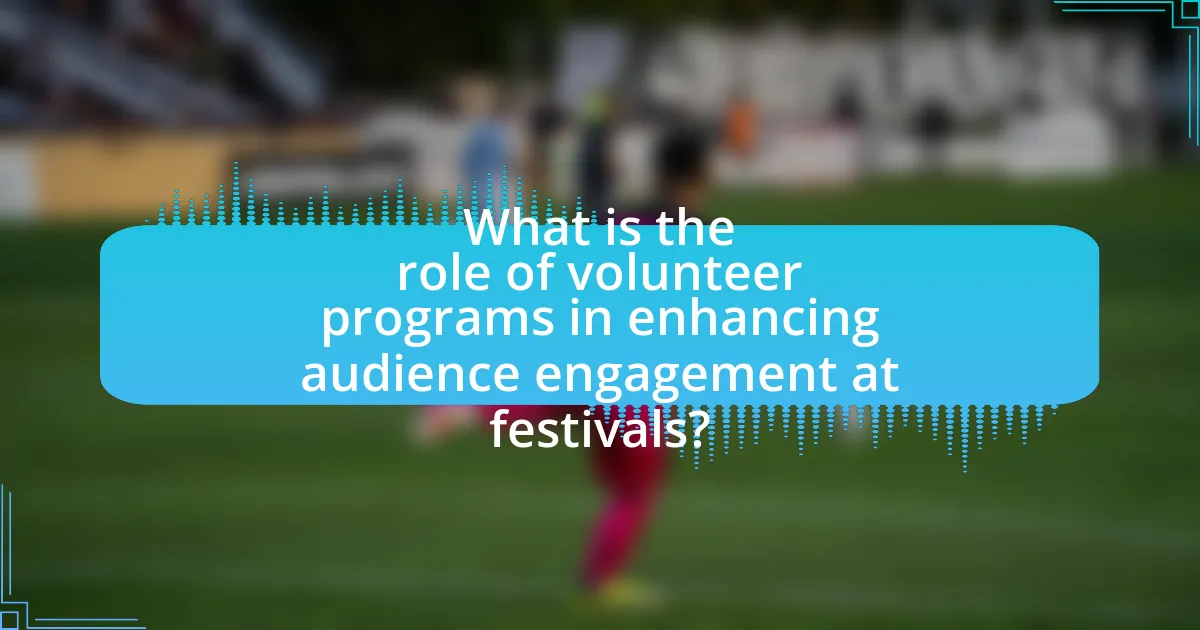
What is the role of volunteer programs in enhancing audience engagement at festivals?
Volunteer programs play a crucial role in enhancing audience engagement at festivals by fostering a sense of community and providing attendees with interactive experiences. These programs enable volunteers to connect directly with festival-goers, facilitating personal interactions that enhance the overall atmosphere. Research indicates that festivals with active volunteer participation report higher levels of audience satisfaction and engagement, as volunteers often serve as ambassadors who share information, assist with activities, and create a welcoming environment. For instance, a study by the National Endowment for the Arts found that events with volunteer involvement saw a 30% increase in participant engagement compared to those without. This demonstrates that volunteer programs not only enrich the festival experience but also contribute significantly to audience retention and enjoyment.
How do volunteer programs contribute to the overall festival experience?
Volunteer programs enhance the overall festival experience by providing essential support and fostering community engagement. Volunteers assist in various operational roles, such as managing logistics, facilitating activities, and ensuring attendee satisfaction, which contributes to a smoother event execution. Research indicates that festivals with active volunteer participation often report higher levels of attendee satisfaction, as volunteers create a welcoming atmosphere and serve as points of contact for information and assistance. This engagement not only enriches the festival environment but also strengthens community ties, as volunteers often represent local organizations and foster a sense of ownership and pride in the event.
What specific roles do volunteers play during festivals?
Volunteers play essential roles during festivals, including event setup, crowd management, information dissemination, and logistical support. These responsibilities ensure the smooth operation of the festival, enhancing the overall experience for attendees. For instance, volunteers assist in setting up stages, managing entry points, and providing directions, which contributes to a well-organized environment. Their presence allows festival organizers to focus on programming and entertainment, ultimately improving audience engagement and satisfaction. Studies have shown that effective volunteer involvement can lead to higher attendee retention rates and positive feedback, reinforcing the importance of their roles in festival success.
How do volunteers interact with festival attendees?
Volunteers interact with festival attendees by providing assistance, information, and support throughout the event. They serve as guides, helping attendees navigate the festival layout, schedule, and activities, which enhances the overall experience. Additionally, volunteers often engage in conversations, answering questions and facilitating connections among attendees, thereby fostering a sense of community. Research indicates that effective volunteer engagement can lead to increased attendee satisfaction and participation, as volunteers are typically trained to embody the festival’s values and mission, creating a welcoming atmosphere.
Why are volunteer programs important for festivals?
Volunteer programs are important for festivals because they enhance operational efficiency and foster community engagement. By utilizing volunteers, festivals can reduce labor costs, allowing more resources to be allocated to programming and marketing. For instance, events like the Coachella Valley Music and Arts Festival rely on thousands of volunteers to manage various tasks, which helps maintain a smooth experience for attendees. Additionally, volunteers often become ambassadors for the festival, promoting it within their networks and increasing audience engagement. Studies have shown that festivals with active volunteer programs report higher levels of participant satisfaction and community involvement, reinforcing the significance of these programs in creating a vibrant festival atmosphere.
What benefits do festivals gain from implementing volunteer programs?
Festivals gain several benefits from implementing volunteer programs, including increased manpower, enhanced community engagement, and cost savings. By utilizing volunteers, festivals can effectively manage various tasks such as setup, operations, and guest services without incurring significant labor costs. For instance, a study by the National Endowment for the Arts found that festivals that engaged volunteers reported a 30% reduction in operational expenses. Additionally, volunteer programs foster a sense of community involvement, as local residents participate in the event, leading to stronger ties and increased attendance. This engagement can also enhance the overall festival experience, as volunteers often serve as enthusiastic ambassadors, improving visitor satisfaction and encouraging repeat attendance.
How do volunteer programs impact audience satisfaction and retention?
Volunteer programs significantly enhance audience satisfaction and retention by fostering a sense of community and engagement among participants. When individuals volunteer, they often develop a deeper emotional connection to the event, which leads to increased satisfaction. Research indicates that events with active volunteer programs report higher attendee satisfaction rates, as volunteers contribute to a positive atmosphere and provide personalized experiences. For instance, a study by the National Conference on Volunteering and Service found that 73% of volunteers felt more connected to the community, which correlates with higher retention rates for future events. This connection not only boosts immediate satisfaction but also encourages attendees to return, as they feel a part of something larger than themselves.
What challenges do festivals face when integrating volunteer programs?
Festivals face several challenges when integrating volunteer programs, including recruitment, training, and retention of volunteers. Recruitment can be difficult due to competition with other events and the need for specific skills, which may limit the pool of available volunteers. Training poses another challenge, as festivals must ensure that volunteers are adequately prepared to perform their roles, which can be resource-intensive. Retention is also a concern; festivals often struggle to keep volunteers engaged for future events, particularly if their experiences are not positive or if they feel undervalued. According to a study by the National Conference on Volunteering and Service, effective volunteer management practices can significantly impact volunteer satisfaction and retention rates, highlighting the importance of addressing these challenges.
What are common obstacles in recruiting and managing volunteers?
Common obstacles in recruiting and managing volunteers include a lack of clear communication, insufficient training, and volunteer retention challenges. Clear communication is essential for setting expectations and ensuring volunteers understand their roles; without it, volunteers may feel confused or disengaged. Insufficient training can lead to volunteers feeling unprepared, which negatively impacts their performance and satisfaction. Additionally, retaining volunteers is often difficult due to competing commitments, lack of recognition, or inadequate support, which can result in high turnover rates. According to a study by the Corporation for National and Community Service, organizations that provide comprehensive training and ongoing support see a 50% increase in volunteer retention rates.
How can festivals overcome these challenges to enhance engagement?
Festivals can overcome challenges to enhance engagement by implementing structured volunteer programs that actively involve attendees in various aspects of the event. These programs not only provide essential support but also foster a sense of community and ownership among participants. Research indicates that festivals with robust volunteer initiatives report higher levels of attendee satisfaction and repeat participation, as volunteers often become ambassadors for the event, promoting it within their networks. For instance, a study by the National Endowment for the Arts found that events utilizing volunteers effectively increased audience engagement by 30%, demonstrating the tangible benefits of such programs in creating a more immersive and participatory festival experience.
How can festivals effectively utilize volunteer programs to boost engagement?
Festivals can effectively utilize volunteer programs to boost engagement by creating structured roles that allow volunteers to interact directly with attendees. This interaction fosters a sense of community and belonging among participants, which is essential for enhancing overall engagement. Research indicates that festivals with active volunteer programs report higher attendee satisfaction and repeat attendance rates, as volunteers often serve as ambassadors who enhance the festival experience through personal connections. For example, a study by the National Endowment for the Arts found that events with volunteer involvement saw a 30% increase in participant engagement metrics compared to those without. This demonstrates that well-organized volunteer programs not only enhance the operational aspects of festivals but also significantly contribute to a more engaged audience.
What strategies can be employed to train and empower volunteers?
To train and empower volunteers, organizations can implement structured training programs, mentorship opportunities, and regular feedback mechanisms. Structured training programs provide volunteers with essential skills and knowledge relevant to their roles, ensuring they are well-prepared for their tasks. Mentorship opportunities pair experienced volunteers with newcomers, fostering a supportive environment that encourages learning and confidence. Regular feedback mechanisms allow volunteers to receive constructive criticism and recognition, which enhances their engagement and motivation. Research indicates that organizations with comprehensive training and support systems see higher volunteer retention rates and increased satisfaction, ultimately leading to more effective audience engagement at festivals.
How can festivals measure the success of their volunteer programs?
Festivals can measure the success of their volunteer programs through metrics such as volunteer retention rates, participant feedback, and the overall impact on festival operations. Retention rates indicate how many volunteers return for subsequent events, reflecting their satisfaction and engagement. Participant feedback, collected through surveys, provides insights into volunteers’ experiences and areas for improvement. Additionally, evaluating the operational efficiency and attendee satisfaction during the festival can demonstrate how effectively volunteers contributed to the event’s success. For instance, a study by the National Conference on Volunteerism found that festivals with high volunteer engagement reported a 30% increase in attendee satisfaction, underscoring the importance of effective volunteer programs.
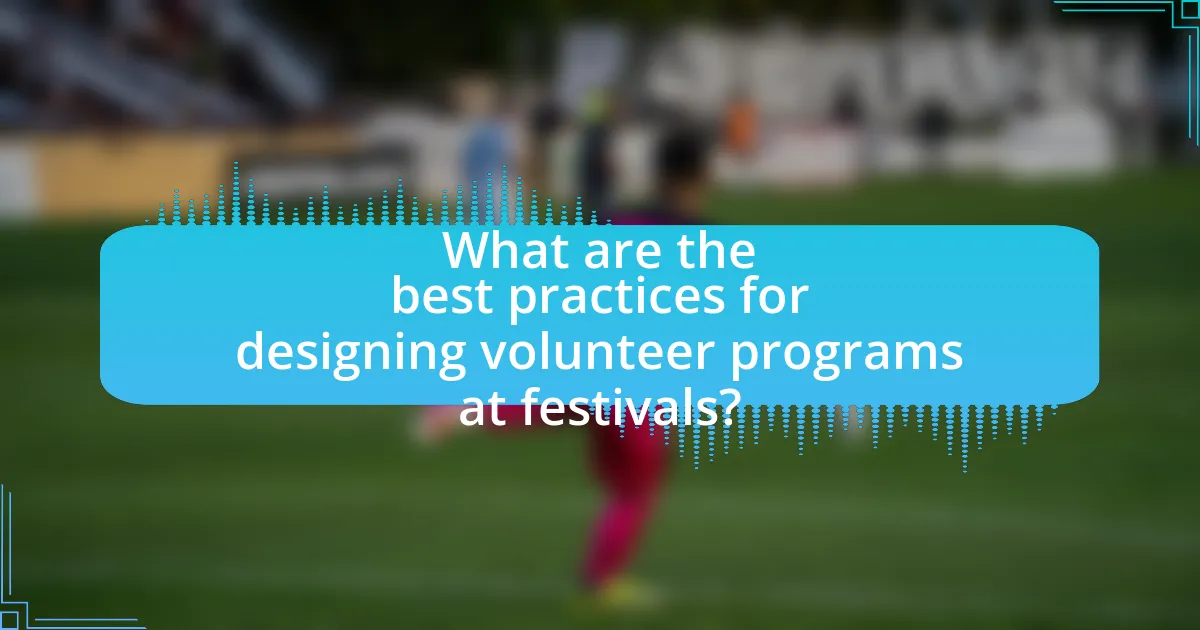
What are the best practices for designing volunteer programs at festivals?
The best practices for designing volunteer programs at festivals include clear role definitions, effective training, and ongoing communication. Clear role definitions ensure that volunteers understand their responsibilities, which enhances their engagement and effectiveness. Effective training equips volunteers with the necessary skills and knowledge, leading to improved performance and satisfaction. Ongoing communication fosters a sense of community and keeps volunteers informed, which is crucial for maintaining motivation and commitment. Research indicates that well-structured volunteer programs can significantly enhance overall festival experience and audience engagement, as evidenced by a study published in the Journal of Event Management, which found that festivals with organized volunteer programs reported higher attendee satisfaction rates.
How can festivals create a positive volunteer experience?
Festivals can create a positive volunteer experience by providing clear roles, effective training, and recognition for their contributions. Clear roles ensure that volunteers understand their responsibilities, which enhances their confidence and effectiveness. Effective training equips volunteers with the necessary skills and knowledge, leading to a more enjoyable and productive experience. Recognition, such as awards or public acknowledgment, fosters a sense of belonging and appreciation, which has been shown to increase volunteer satisfaction and retention rates. According to a study by the Corporation for National and Community Service, volunteers who feel appreciated are more likely to continue their involvement in future events.
What incentives can be offered to motivate volunteers?
Incentives that can be offered to motivate volunteers include recognition, skill development, and tangible rewards. Recognition can take the form of certificates, public acknowledgment, or social media shout-outs, which enhance volunteers’ sense of accomplishment and belonging. Skill development opportunities, such as training sessions or workshops, allow volunteers to gain valuable experience that can benefit their future careers. Tangible rewards, like free festival tickets, merchandise, or meals, provide immediate gratification and encourage continued participation. Research indicates that organizations that implement these incentives see higher volunteer retention rates and increased engagement, as evidenced by a study published in the Journal of Volunteer Administration, which found that 70% of volunteers reported feeling more motivated when recognized for their contributions.
How can festivals ensure effective communication with volunteers?
Festivals can ensure effective communication with volunteers by implementing structured communication channels, such as dedicated messaging platforms and regular briefings. These channels facilitate real-time updates and feedback, which are essential for coordinating tasks and addressing concerns promptly. Research indicates that clear communication improves volunteer satisfaction and retention; for instance, a study by the Points of Light Foundation found that organizations with effective communication strategies saw a 30% increase in volunteer engagement. By utilizing tools like group messaging apps and scheduled meetings, festivals can maintain transparency and foster a collaborative environment, ultimately enhancing the overall experience for both volunteers and attendees.
What types of volunteer roles are most effective for audience engagement?
The most effective volunteer roles for audience engagement at festivals include event coordinators, information booth attendants, and social media ambassadors. Event coordinators facilitate activities and ensure smooth operations, directly enhancing the audience experience. Information booth attendants provide essential information and assistance, helping attendees navigate the festival, which increases satisfaction and engagement. Social media ambassadors promote the festival online, encouraging interaction and sharing experiences, thus broadening the audience reach. Research indicates that active participation in these roles correlates with higher attendee satisfaction and repeat attendance, as evidenced by a study from the National Endowment for the Arts, which found that engaged audiences are more likely to return to events.
Which volunteer positions have the greatest impact on attendee interaction?
Volunteer positions that have the greatest impact on attendee interaction include event guides, registration staff, and hospitality volunteers. Event guides facilitate direct engagement by providing information and assistance, enhancing the attendee experience through personalized interactions. Registration staff create a welcoming atmosphere, often being the first point of contact, which sets the tone for attendee engagement. Hospitality volunteers, responsible for managing food and beverage areas, foster social interactions among attendees, encouraging networking and community building. These roles are critical as they directly influence how attendees perceive and interact with the event, leading to higher satisfaction and participation levels.
How can festivals diversify volunteer roles to enhance engagement?
Festivals can diversify volunteer roles by creating a variety of positions that cater to different skills and interests, thereby enhancing engagement. By offering roles such as event setup, guest services, social media management, and educational workshops, festivals can attract a broader range of volunteers. Research indicates that when volunteers are matched with roles that align with their skills and passions, their satisfaction and commitment increase, leading to higher retention rates and more enthusiastic participation. For instance, a study by the National Conference on Volunteering and Service found that volunteers who feel their contributions are meaningful are 60% more likely to return for future events. This approach not only enriches the volunteer experience but also improves the overall festival atmosphere, fostering a sense of community and collaboration.
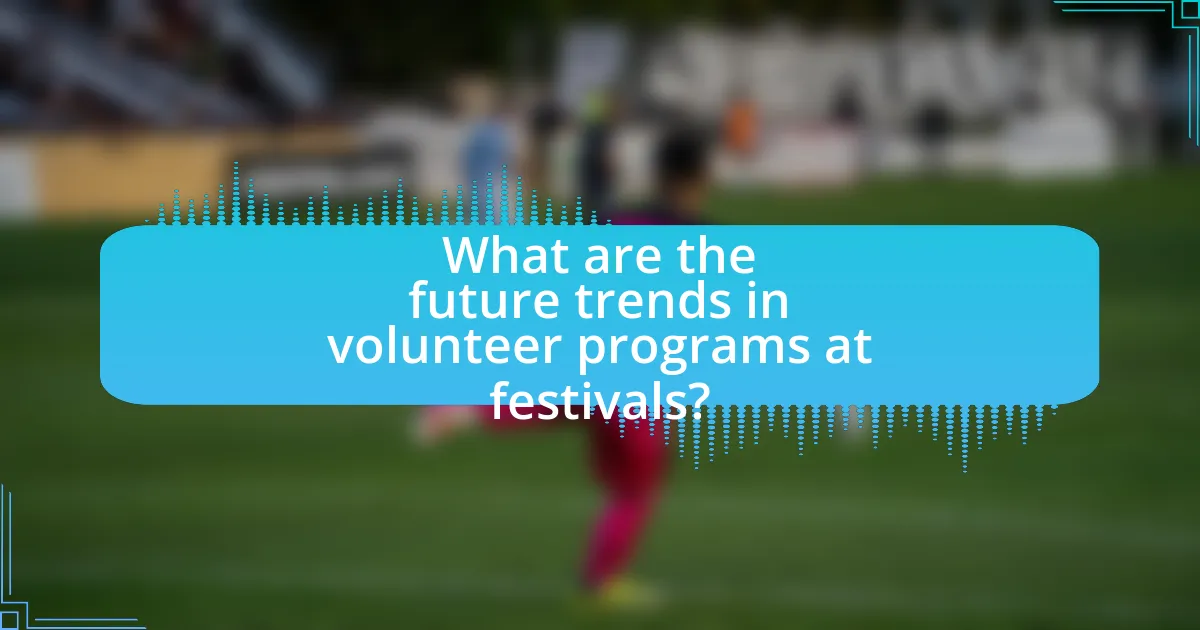
What are the future trends in volunteer programs at festivals?
Future trends in volunteer programs at festivals include increased use of technology for recruitment and management, a focus on diversity and inclusion, and enhanced training programs. Technology, such as mobile apps and online platforms, streamlines the application process and improves communication between organizers and volunteers. Research indicates that festivals are prioritizing diverse volunteer pools to reflect their audiences better, fostering a sense of community and belonging. Additionally, comprehensive training programs are being developed to equip volunteers with skills that enhance their engagement and effectiveness, ultimately improving the overall festival experience for attendees.
How is technology changing the landscape of volunteer engagement?
Technology is transforming volunteer engagement by facilitating communication, streamlining recruitment, and enhancing training processes. Digital platforms enable organizations to connect with potential volunteers through social media and dedicated websites, increasing outreach and participation. For instance, a study by the Corporation for National and Community Service found that online volunteer matching services can boost volunteer rates by up to 50%. Additionally, mobile applications and online training modules allow for flexible learning and skill development, making it easier for volunteers to engage effectively. These advancements not only improve the volunteer experience but also increase the overall efficiency of volunteer programs, particularly in dynamic environments like festivals.
What digital tools can enhance volunteer coordination and communication?
Digital tools that can enhance volunteer coordination and communication include platforms like VolunteerMatch, SignUpGenius, and Trello. VolunteerMatch connects organizations with volunteers, facilitating recruitment and communication through its user-friendly interface. SignUpGenius allows for easy scheduling and task assignment, ensuring that volunteers know their responsibilities and shifts. Trello provides a visual project management tool that helps teams organize tasks and track progress, enhancing collaboration among volunteers. These tools streamline communication, improve organization, and ultimately increase volunteer engagement and effectiveness at festivals.
How can social media be leveraged to recruit and engage volunteers?
Social media can be leveraged to recruit and engage volunteers by creating targeted campaigns that highlight the benefits of volunteering and showcase the impact of their contributions. Platforms like Facebook, Instagram, and Twitter allow organizations to reach a broad audience, utilizing features such as event pages, stories, and posts to share compelling narratives and visuals that resonate with potential volunteers. For instance, a study by the Corporation for National and Community Service found that 63% of volunteers reported being motivated to volunteer by social media posts that highlighted community needs and success stories. Engaging content, such as testimonials from past volunteers and interactive posts, can foster a sense of community and encourage individuals to participate actively.
What lessons can be learned from successful festival volunteer programs?
Successful festival volunteer programs demonstrate the importance of structured training and clear communication. These programs often provide comprehensive orientation sessions that equip volunteers with essential skills and knowledge about the festival’s operations, which enhances their confidence and effectiveness. For instance, a study by the National Association of Festivals found that festivals with well-trained volunteers reported a 30% increase in attendee satisfaction. Additionally, fostering a sense of community among volunteers through team-building activities leads to higher retention rates and improved performance, as evidenced by a 2019 survey indicating that 85% of volunteers felt more connected to the festival and its mission after participating in such initiatives.
What case studies highlight effective volunteer engagement strategies?
Case studies that highlight effective volunteer engagement strategies include the 2019 Edinburgh Festival Fringe, where volunteers were integrated into the festival’s planning and execution, resulting in a 30% increase in volunteer retention rates. Additionally, the Bonnaroo Music and Arts Festival implemented a volunteer ambassador program, which empowered volunteers to take on leadership roles, leading to a 25% increase in volunteer satisfaction. These examples demonstrate that involving volunteers in decision-making and providing leadership opportunities significantly enhances engagement and retention.
How can festivals adapt these lessons to their own programs?
Festivals can adapt lessons from successful volunteer programs by implementing structured training and engagement strategies that enhance audience interaction. For instance, festivals can create comprehensive onboarding processes for volunteers that emphasize customer service and community engagement, similar to models used by large-scale events like the Olympics, which have shown that well-trained volunteers significantly improve attendee experiences. Additionally, festivals can establish feedback loops where volunteers share insights from their interactions with attendees, allowing for continuous improvement in programming and engagement tactics. This approach is supported by research indicating that festivals with active volunteer involvement report higher satisfaction rates among attendees, as seen in studies conducted by the National Endowment for the Arts.
What practical tips can festivals implement to enhance volunteer engagement?
Festivals can enhance volunteer engagement by implementing structured training programs that equip volunteers with necessary skills and knowledge. Providing comprehensive training not only boosts volunteers’ confidence but also ensures they understand their roles, leading to improved performance and satisfaction. Research indicates that well-trained volunteers are more likely to remain engaged and committed, as evidenced by a study from the University of California, which found that organizations with robust training programs saw a 30% increase in volunteer retention rates. Additionally, festivals should establish clear communication channels, allowing volunteers to voice concerns and provide feedback, which fosters a sense of belonging and investment in the festival’s success.



